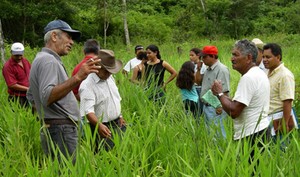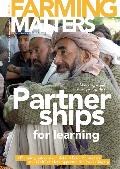Partnerships and scaling up in Central America.
The “Degraded Pastures” project in Central America has had an impact that has extended far beyond the duration and scope of the project. This is because the joint learning process that it established motivated the participants to continue working together, and also motivated other organisations, both public and private, to join or support them.

However, between 50-70% of those pastures are degraded, with low forage yields that have poor nutritive value. This lowers their carrying capacity and the performance of the cattle. Equally, degraded pastures are less effective in providing ecosystem services, such as carbon sequestration, biodiversity and water availability and quality. All these aspects of pasture degradation reduce the income and food security of livestock farmer families and the livelihoods of rural communities.
Learning about sustainable land use…
Between 2003 and 2008, the Tropical Agriculture Research and Higher Education Center (CATIE) carried out a project on sustainable land use alternatives for degraded pasture lands in Central America, the “Degraded Pastures” project. Its main objective was to promote a joint learning process between livestock farmers and their families, the staff of research and development institutions and policy makers. This was intended to develop and strengthen peoples’ capabilities and skills for more sustainable land use practices. In this article we only refer to the experiences in El Petén (Guatemala), although similar results were achieved in central Nicaragua and the northern coast of Honduras.
Although several institutions (academic, governmental and NGOs) were invited to participate, during the first two years the project staff worked almost solely with farmers’ groups. Potential institutional partners appeared hesitant to participate and follow approaches that deviated from the “top-down” extension model with its “sender-receiver” approach to communication. But in the end, the use of the Farmer Field School methodology was highly appreciated by farmers and by the field staff of the institutions that did participate. This approach helped catalyse a general shift in training modes from the formal, traditional approaches, towards a more practical “learning-bydoing” approach.
… through more participatory methods
All programme partners were trained in Livestock Farmer Field Schools methodologies to ensure that sessions followed the principles of participatory learning and experimentation. An unplanned result of the exposure of faculty staff to these innovative methods was the introduction of “new” topics (such as agroforestry, rural development, sociology and tropical forages) into the curricula of several undergraduate courses at the university. FFS methodologies also became part of the basic training for advanced students. Between 2007 and 2008, 230 students, and 46 lecturers and other staff of partner institutions were trained in Guatemala (and an equivalent number of professionals and students were trained in Honduras and Nicaragua).
Forty Farmer Field Schools, with more than 500 participants, were established in different regions of Guatemala. In the lowlands (in the southern and eastern part of the country) these focused on dualpurpose cattle systems, the main livestock activity. In the Central Highlands they focused on small ruminants. In all cases advanced students and staff from the university functioned as facilitators. The target groups were very diverse, from “ladino” men who traditionally work with cattle, to women from the Ixil ethnic group. It was expected that these experiences would enrich the curricula of other agriculture schools in Central America, and result in a large group of motivated young professionals trained in effective extension measures that can be used in other communities in the region.
Expanding and sustaining success
The Degraded Pastures project tried to engage institutions by sharing documented experiences and by offering to train staff in participatory methods. They also organised farmer-to-farmer exchange visits, inviting new groups to visit those that had participated in the project for at least two years. And they shared project resources with partner institutions and new farmer groups in order to scale up efforts.
By the end of the project, many of the partners had become enthusiastic participants, having seen the benefits of using participatory approaches. A similar change was seen, for example, with one of the project’s concrete activities, the Leucaena protein bank. Before this started, farmers believed that livestock could only be fed on pastures. Farmers learned to feed their livestock with Leucaena, which became an important fodder during the dry season. At the start of the project, only one hectare was established on one farm; after three years, more than 160 farmers were growing 100 hectares of Leucaena.
The University of San Carlos of Guatemala, four El Petén municipalities and two regional NGOs (FUNDEBASE and PROPETEN) joined forces to further promote and scale up this approach. The municipalities of San Luis, Dolores, Melchor de Mencos and Poptún (grouped together as the Commonwealth of Municipalities in Southern Petén, MANMUNISURP), hired two livestock extensionists and contacted FUNDEBASE to work as partners. This partnership was positively evaluated by the local governments, in particular by the newly elected mayors, because it provided technical assistance to the previously neglected smallholder livestock sector. The local authorities were particularly impressed by the attitude and motivation of the NGO staff trained by the Field School.
The experience gained by FUNDEBASE through the work done in association to MANMUNISURP and the Degraded Pastures project, motivated its leaders to take a more relevant position in a new partnership project: “Sustainable use of agricultural land in Mesoamerica” (MESOTERRA). FUNDEBASE is promoting participatory and territorial approaches within this project. They estimate that, by the end of 2010, they will have worked with 625 small and medium scale farmers, and strengthened a network of more than 250 rural promoters in three municipalities of El Petén. In this new partnership, FUNDEBASE is applying the experiences in livestock production from the Degraded Pastures project, as well as strengthening platforms of community leadership at the municipal and departmental levels.
Farmers’ interests
MESOTERRA also covers livestock systems, so the methodological approach and training materials developed by the Degraded Pastures project are still relevant in this programme, and are being applied by new partners and communities with good success, leading to an improvement in farmers’ livestock activities.
Livestock farmers are interested in developing partnerships, and are very keen to diversify and/ or intensify their traditional cattle systems, as they are faced with declining beef prices. Opportunities for exporting hair sheep to Mexico and support for reforestation are two of the options identified from the Degraded Pastures project that farmers find interesting. At the same time, more information is needed about the interactions between livestock and forest plantations in order to revise the current regulations for reforestation incentives. Members of the different partnerships, NGOs, national and regional authorities, municipalities and the local associations of livestock farmers and of tree growers are working together to resolve these issues.
Further scaling up of the lessons learnt
In early 2010, civil society organisations in the watershed of Lake Peten-Itza expressed their concern about the conservation of the lake and started an initiative called “All Together for the Lake”. This platform included the local municipalities, the Ministry of Agriculture and Livestock (MAGA), the National Forestry Institute (INAB), the National Council for Protected Areas (CONAP) and many members of the civil society. They are seeking to promote eco-friendly production systems in order to reduce erosion, preserve the volume and quality of water in the lake, improve the livelihoods of the communities and contribute to the conservation of natural resources and wildlife within the watershed.
The members of the platform saw value in the approach developed by the Degraded Pastures project, and use it as a source of information and inspiration for promoting sustainable management in the watershed. They are making use of several mechanisms developed by the Degraded Pastures project, including Farmer Field Schools; the ways of generating field-based knowledge that can be used for building land use policy proposals; or also the way of providing efficient and effective technical assistance to livestock farmers.
More opportunities
Projects have a fixed life span and spatial range. However, the dynamics of institutions and communities may create opportunities for the lessons learned from a project to be more widely applied, even when the project is finished. These experiences from Guatemala show that the opportunities for scaling up projects can greatly exceed the original expectations of the originators of a project. The training of technical staff and farmers, and a systematic sharing of experiences within a partnership, can open the doors for the lessons learned being much more widely spread.
Text: Danilo Pezo, Jorge Cruz, Karen Hernández and Raúl Villeda


